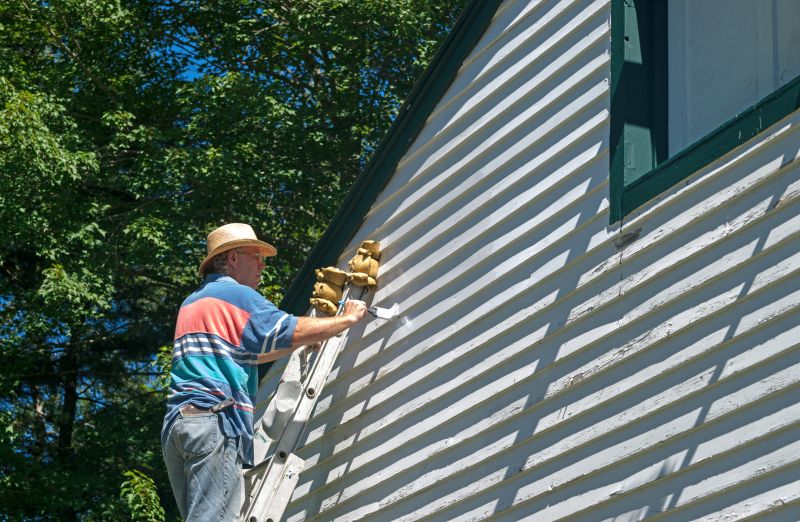Ultimate Guide To House Siding Painting Supplies And Tools
Learn about the key products that ensure a flawless siding painting project from prep to finish.
 Choosing the right products for house siding painting is essential for achieving a durable and visually appealing finish. The process involves selecting appropriate paints, primers, brushes, rollers, and protective coatings that suit the material and condition of the siding. Different siding materials such as vinyl, wood, fiber cement, and metal require specific types of paints and preparation techniques to ensure longevity and optimal appearance. Proper surface preparation, including cleaning and repairing damaged areas, is a critical first step before applying any coating.
Choosing the right products for house siding painting is essential for achieving a durable and visually appealing finish. The process involves selecting appropriate paints, primers, brushes, rollers, and protective coatings that suit the material and condition of the siding. Different siding materials such as vinyl, wood, fiber cement, and metal require specific types of paints and preparation techniques to ensure longevity and optimal appearance. Proper surface preparation, including cleaning and repairing damaged areas, is a critical first step before applying any coating.
Top Overall Option
High-Quality Exterior Paint
A versatile exterior paint formulated for durability and weather resistance, suitable for various siding materials. It provides good adhesion, color retention, and protection against the elements, making it a reliable choice for long-lasting siding finishes.
Types of Products For House Siding Paintings
Acrylic Exterior Paint
Water-based paint known for ease of application and quick drying times, suitable for most siding types.
Oil-Based Exterior Paint
Offers excellent adhesion and durability, often used for surfaces requiring extra protection.
Primer for Siding
Prepares surfaces for painting, enhances adhesion, and helps prevent peeling and staining.
Stain and Sealant
Provides color and protection for wood siding, allowing the natural grain to show through.
Spray Paint for Siding
Ideal for large areas, offering quick and even coverage with specialized formulations for siding materials.
Brushes for Exterior Painting
Various sizes and bristle types designed for detailed work and smooth finishes.
Rollers for House Siding
Different nap lengths and materials tailored for applying paint efficiently on large surfaces.
Protective Coatings
Sealants and topcoats that add an extra layer of defense against weathering and UV damage.
Cleaning Solutions
Specialized cleaners to prepare siding surfaces before painting, ensuring better adhesion.
Touch-Up Kits
Small containers of paint and tools for maintenance and minor repairs.
Heat-Resistant Coatings
Designed for siding exposed to high temperatures or direct sunlight.
Anti-Mildew Paints
Formulated to resist mold and mildew growth on exterior surfaces.
Textured Paints
Add decorative finishes and hide surface imperfections.
Weatherproof Sealants
Provide waterproofing and flexibility for siding joints and seams.
Popular Choices
Widely used for its ease of application and good coverage on various siding materials.
Popular for creating a smooth base and ensuring longevity of the topcoat.
Favored for large projects due to their efficiency and even coverage.
Preferred for faster application on expansive siding surfaces.
Chosen for wood siding to add color while protecting the surface.
Popular for siding exposed to prolonged sunlight, helping maintain color integrity.
Commonly selected for humid or shaded areas prone to mold growth.
Used for siding joints to accommodate expansion and contraction.
Popular for preparing surfaces effectively before painting.
Convenient for minor repairs and maintaining a uniform appearance.
Chosen for added protection against rain, snow, and wind.
Selected for aesthetic enhancement and hiding surface imperfections.
Popular for siding in hot climates to reduce heat absorption.
The variety of products available can be overwhelming, with options tailored to different textures, finishes, and application methods. For instance, high-quality exterior paints often come with weather-resistant formulations designed to withstand harsh elements. Primers are essential for enhancing adhesion and providing a uniform base for the topcoat. Brushes and rollers vary in size and material, offering different textures and coverage levels, while sprayers can facilitate faster application on larger surfaces. Protective coatings such as sealants and primers help prevent issues like peeling, cracking, and fading over time.
Understanding the specific requirements of your siding type and climate conditions can guide your product choices. For example, wood siding may benefit from stain-blocking primers and semi-transparent stains, whereas vinyl siding generally requires paint formulated for plastic surfaces. Proper application techniques, including surface preparation and drying times, are crucial for achieving a professional-looking finish. Regular maintenance and touch-ups can extend the life of your siding paint, preserving your home's curb appeal.
Investing in the right products and tools not only enhances the appearance but also helps protect your home from environmental damage. Whether you are repainting an existing surface or undertaking a new siding project, choosing compatible, high-quality products tailored to your specific needs will contribute to a successful outcome. Always follow manufacturer instructions and consider consulting with professionals if unsure about the best products for your siding type.
Key Buying Considerations
- Compatibility with your siding material to ensure proper adhesion.
- Weather resistance features suitable for your climate conditions.
- Type of finish desired, such as matte, satin, or gloss.
- Ease of application and drying times to fit your schedule.
- Coverage area per unit to estimate quantities needed.
- Preparation requirements, including cleaning and priming.
- Protection against mold, mildew, and UV damage.
- Compatibility of primers and topcoats for better results.
- Durability and longevity of the coating based on environmental exposure.
- Ease of touch-up and maintenance over time.
- Availability of color options and custom matching capabilities.
- Application tools required, such as brushes, rollers, or sprayers.
- Environmental conditions during application to prevent issues like cracking.
- Budget considerations balanced with product quality.
- Manufacturer instructions and recommended drying times for best results.
